Analysis of the IASB Conceptual Framework for Financial Reporting
VerifiedAdded on 2021/01/03
|7
|1420
|299
Report
AI Summary
This report provides an overview of the IASB's Conceptual Framework for financial reporting. It begins by introducing the framework and its purpose in setting accounting standards and guiding the preparation of financial statements. The report explores the objectives of financial reporting, emphasizing the provision of relevant and useful information to stakeholders for decision-making. It then delves into the fundamental qualitative characteristics of financial information, including relevance and faithful representation, along with enhancing qualities such as comparability, verifiability, timeliness, and understandability. The report further discusses key concepts and assumptions, such as the recognition concept, measurement concept, disclosure concept, economic entity, going concern, monetary unit, periodicity, and accrual basis. The conclusion summarizes the importance of the conceptual framework in providing relevant information and guiding effective decision-making.
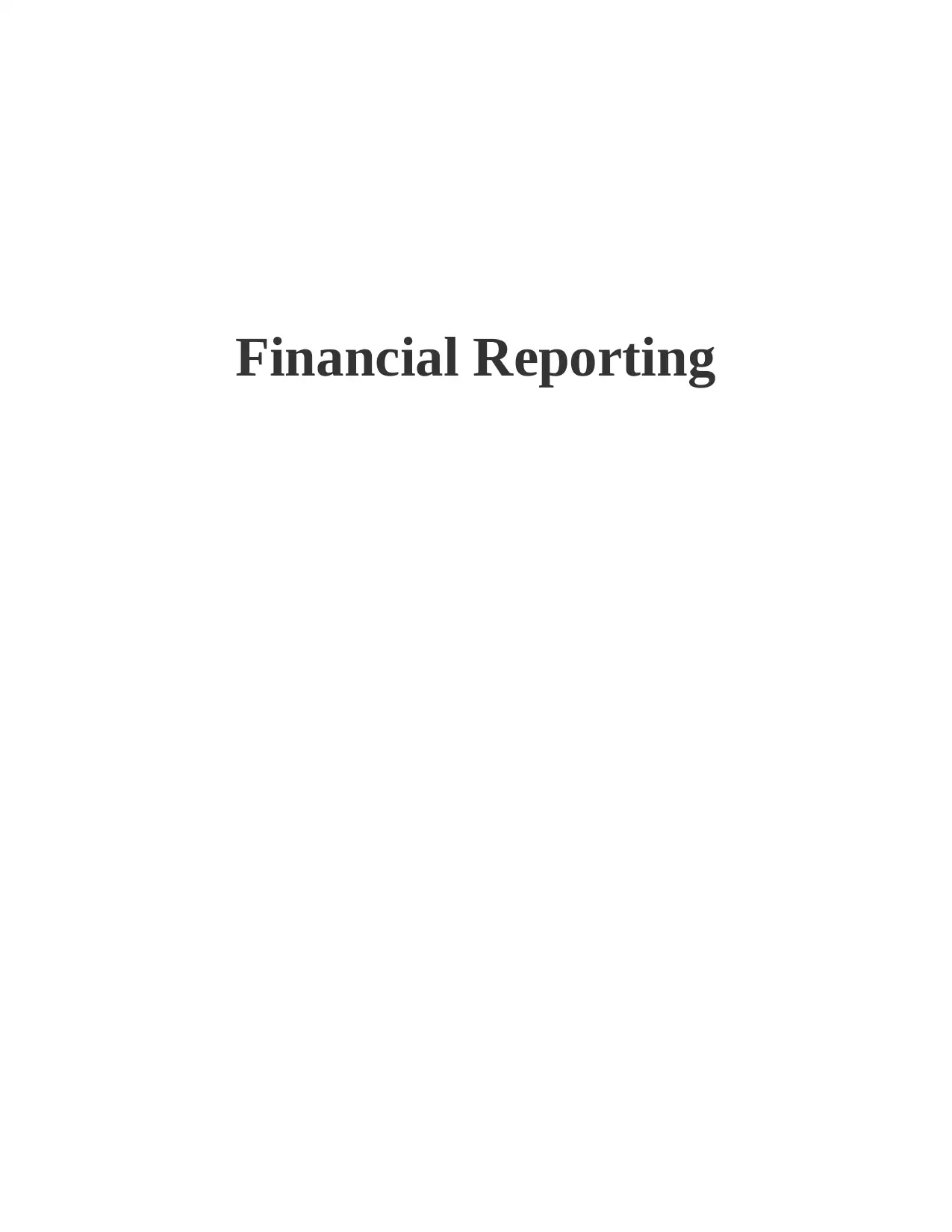
Financial Reporting
Paraphrase This Document
Need a fresh take? Get an instant paraphrase of this document with our AI Paraphraser
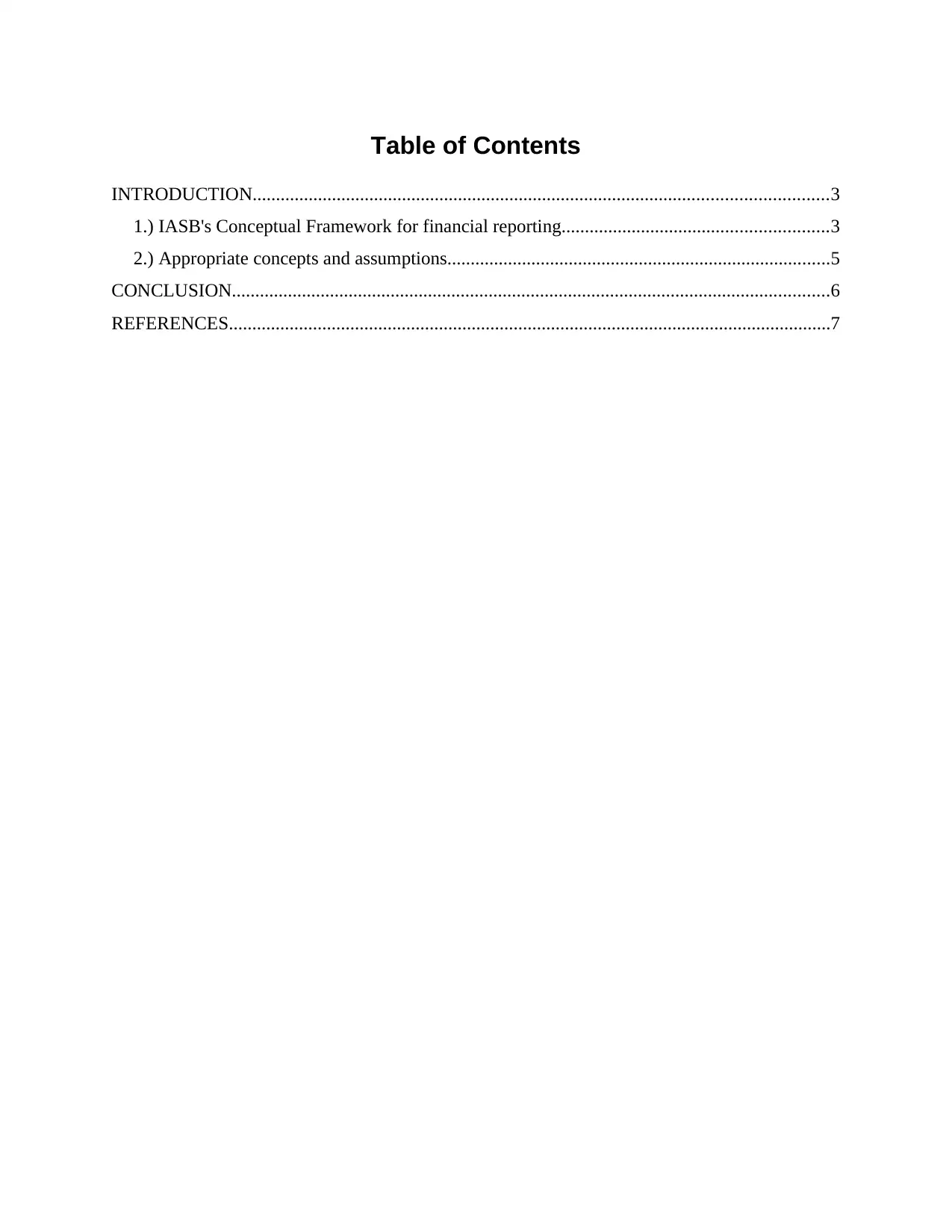
Table of Contents
INTRODUCTION...........................................................................................................................3
1.) IASB's Conceptual Framework for financial reporting.........................................................3
2.) Appropriate concepts and assumptions..................................................................................5
CONCLUSION................................................................................................................................6
REFERENCES.................................................................................................................................7
INTRODUCTION...........................................................................................................................3
1.) IASB's Conceptual Framework for financial reporting.........................................................3
2.) Appropriate concepts and assumptions..................................................................................5
CONCLUSION................................................................................................................................6
REFERENCES.................................................................................................................................7
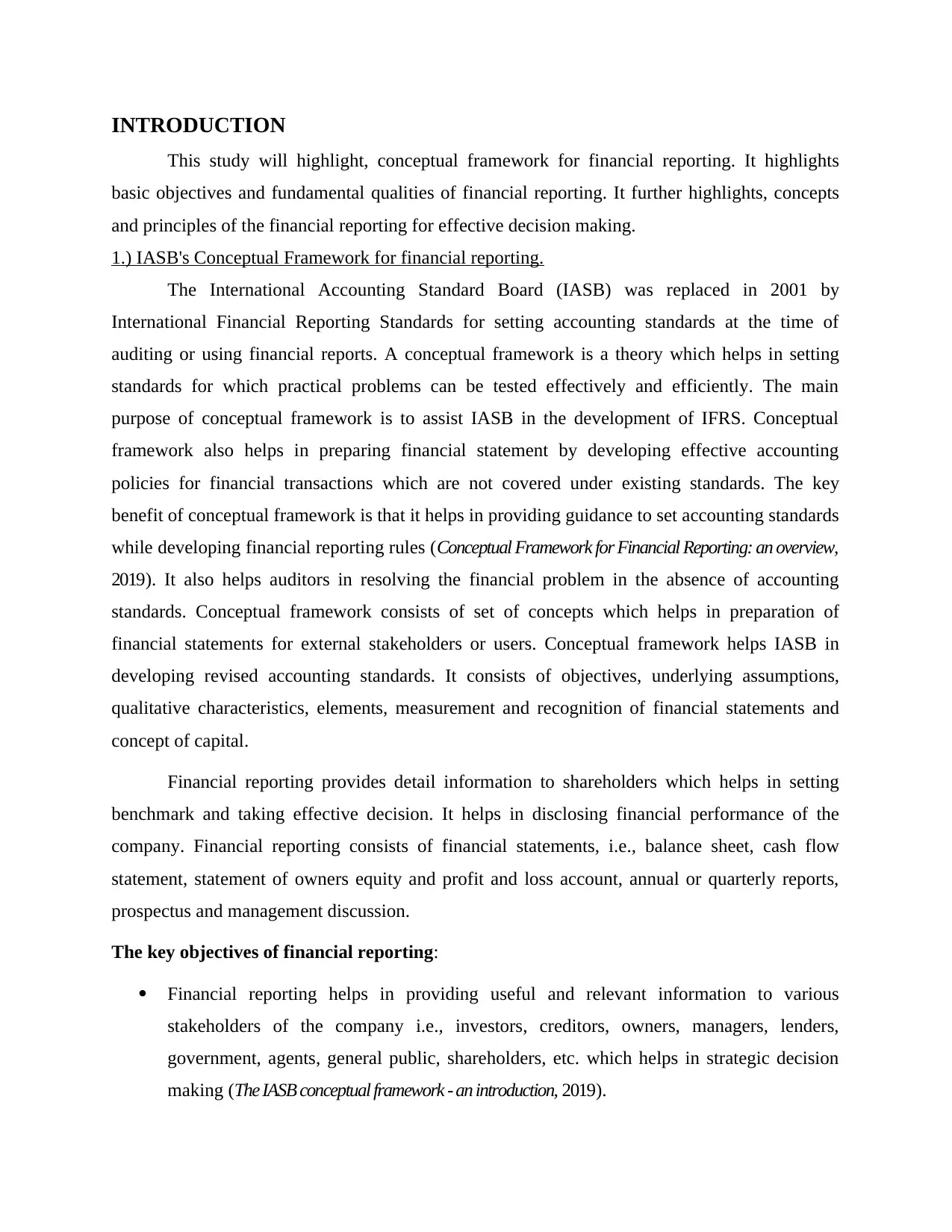
INTRODUCTION
This study will highlight, conceptual framework for financial reporting. It highlights
basic objectives and fundamental qualities of financial reporting. It further highlights, concepts
and principles of the financial reporting for effective decision making.
1.) IASB's Conceptual Framework for financial reporting.
The International Accounting Standard Board (IASB) was replaced in 2001 by
International Financial Reporting Standards for setting accounting standards at the time of
auditing or using financial reports. A conceptual framework is a theory which helps in setting
standards for which practical problems can be tested effectively and efficiently. The main
purpose of conceptual framework is to assist IASB in the development of IFRS. Conceptual
framework also helps in preparing financial statement by developing effective accounting
policies for financial transactions which are not covered under existing standards. The key
benefit of conceptual framework is that it helps in providing guidance to set accounting standards
while developing financial reporting rules (Conceptual Framework for Financial Reporting: an overview,
2019). It also helps auditors in resolving the financial problem in the absence of accounting
standards. Conceptual framework consists of set of concepts which helps in preparation of
financial statements for external stakeholders or users. Conceptual framework helps IASB in
developing revised accounting standards. It consists of objectives, underlying assumptions,
qualitative characteristics, elements, measurement and recognition of financial statements and
concept of capital.
Financial reporting provides detail information to shareholders which helps in setting
benchmark and taking effective decision. It helps in disclosing financial performance of the
company. Financial reporting consists of financial statements, i.e., balance sheet, cash flow
statement, statement of owners equity and profit and loss account, annual or quarterly reports,
prospectus and management discussion.
The key objectives of financial reporting:
Financial reporting helps in providing useful and relevant information to various
stakeholders of the company i.e., investors, creditors, owners, managers, lenders,
government, agents, general public, shareholders, etc. which helps in strategic decision
making (The IASB conceptual framework - an introduction, 2019).
This study will highlight, conceptual framework for financial reporting. It highlights
basic objectives and fundamental qualities of financial reporting. It further highlights, concepts
and principles of the financial reporting for effective decision making.
1.) IASB's Conceptual Framework for financial reporting.
The International Accounting Standard Board (IASB) was replaced in 2001 by
International Financial Reporting Standards for setting accounting standards at the time of
auditing or using financial reports. A conceptual framework is a theory which helps in setting
standards for which practical problems can be tested effectively and efficiently. The main
purpose of conceptual framework is to assist IASB in the development of IFRS. Conceptual
framework also helps in preparing financial statement by developing effective accounting
policies for financial transactions which are not covered under existing standards. The key
benefit of conceptual framework is that it helps in providing guidance to set accounting standards
while developing financial reporting rules (Conceptual Framework for Financial Reporting: an overview,
2019). It also helps auditors in resolving the financial problem in the absence of accounting
standards. Conceptual framework consists of set of concepts which helps in preparation of
financial statements for external stakeholders or users. Conceptual framework helps IASB in
developing revised accounting standards. It consists of objectives, underlying assumptions,
qualitative characteristics, elements, measurement and recognition of financial statements and
concept of capital.
Financial reporting provides detail information to shareholders which helps in setting
benchmark and taking effective decision. It helps in disclosing financial performance of the
company. Financial reporting consists of financial statements, i.e., balance sheet, cash flow
statement, statement of owners equity and profit and loss account, annual or quarterly reports,
prospectus and management discussion.
The key objectives of financial reporting:
Financial reporting helps in providing useful and relevant information to various
stakeholders of the company i.e., investors, creditors, owners, managers, lenders,
government, agents, general public, shareholders, etc. which helps in strategic decision
making (The IASB conceptual framework - an introduction, 2019).
⊘ This is a preview!⊘
Do you want full access?
Subscribe today to unlock all pages.

Trusted by 1+ million students worldwide
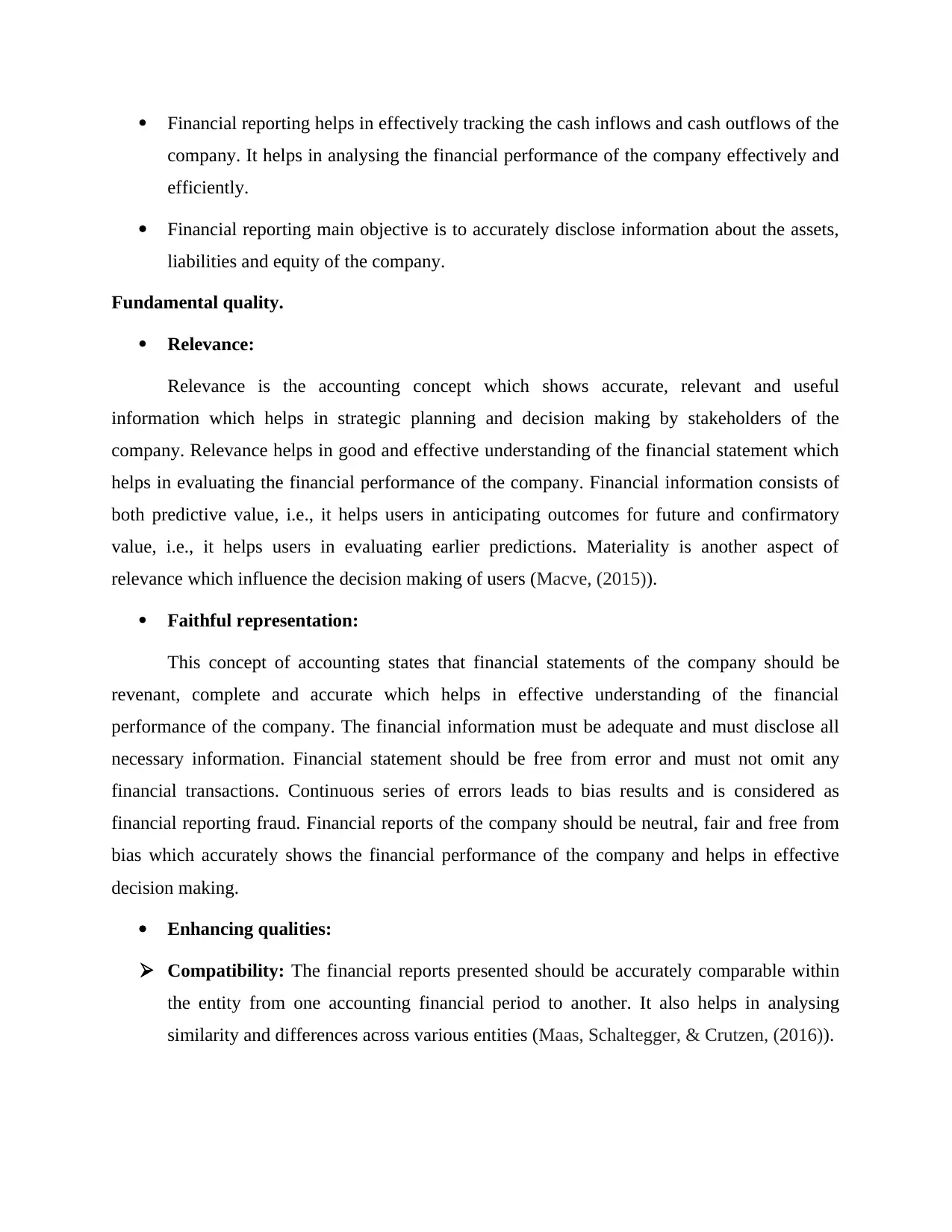
Financial reporting helps in effectively tracking the cash inflows and cash outflows of the
company. It helps in analysing the financial performance of the company effectively and
efficiently.
Financial reporting main objective is to accurately disclose information about the assets,
liabilities and equity of the company.
Fundamental quality.
Relevance:
Relevance is the accounting concept which shows accurate, relevant and useful
information which helps in strategic planning and decision making by stakeholders of the
company. Relevance helps in good and effective understanding of the financial statement which
helps in evaluating the financial performance of the company. Financial information consists of
both predictive value, i.e., it helps users in anticipating outcomes for future and confirmatory
value, i.e., it helps users in evaluating earlier predictions. Materiality is another aspect of
relevance which influence the decision making of users (Macve, (2015)).
Faithful representation:
This concept of accounting states that financial statements of the company should be
revenant, complete and accurate which helps in effective understanding of the financial
performance of the company. The financial information must be adequate and must disclose all
necessary information. Financial statement should be free from error and must not omit any
financial transactions. Continuous series of errors leads to bias results and is considered as
financial reporting fraud. Financial reports of the company should be neutral, fair and free from
bias which accurately shows the financial performance of the company and helps in effective
decision making.
Enhancing qualities:
Compatibility: The financial reports presented should be accurately comparable within
the entity from one accounting financial period to another. It also helps in analysing
similarity and differences across various entities (Maas, Schaltegger, & Crutzen, (2016)).
company. It helps in analysing the financial performance of the company effectively and
efficiently.
Financial reporting main objective is to accurately disclose information about the assets,
liabilities and equity of the company.
Fundamental quality.
Relevance:
Relevance is the accounting concept which shows accurate, relevant and useful
information which helps in strategic planning and decision making by stakeholders of the
company. Relevance helps in good and effective understanding of the financial statement which
helps in evaluating the financial performance of the company. Financial information consists of
both predictive value, i.e., it helps users in anticipating outcomes for future and confirmatory
value, i.e., it helps users in evaluating earlier predictions. Materiality is another aspect of
relevance which influence the decision making of users (Macve, (2015)).
Faithful representation:
This concept of accounting states that financial statements of the company should be
revenant, complete and accurate which helps in effective understanding of the financial
performance of the company. The financial information must be adequate and must disclose all
necessary information. Financial statement should be free from error and must not omit any
financial transactions. Continuous series of errors leads to bias results and is considered as
financial reporting fraud. Financial reports of the company should be neutral, fair and free from
bias which accurately shows the financial performance of the company and helps in effective
decision making.
Enhancing qualities:
Compatibility: The financial reports presented should be accurately comparable within
the entity from one accounting financial period to another. It also helps in analysing
similarity and differences across various entities (Maas, Schaltegger, & Crutzen, (2016)).
Paraphrase This Document
Need a fresh take? Get an instant paraphrase of this document with our AI Paraphraser
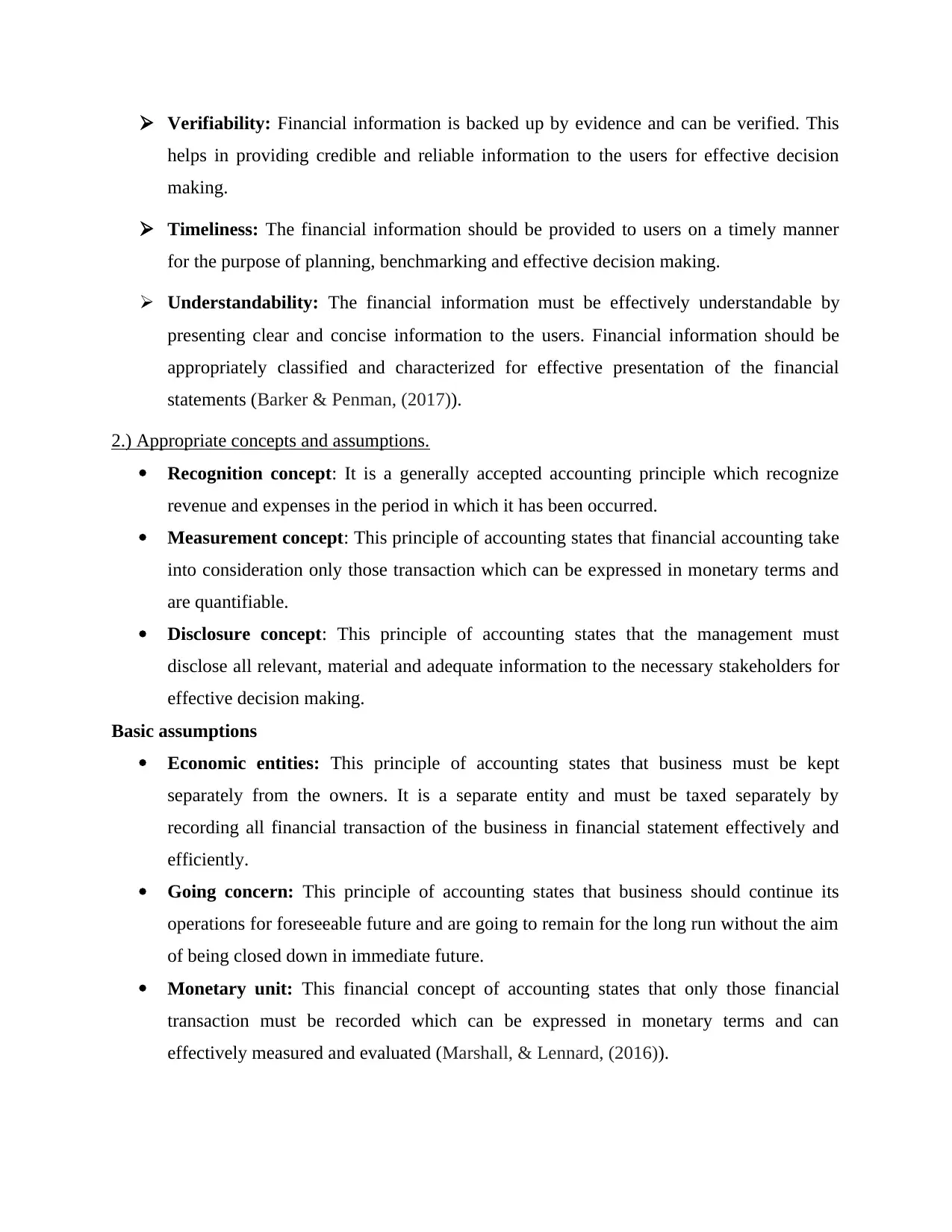
Verifiability: Financial information is backed up by evidence and can be verified. This
helps in providing credible and reliable information to the users for effective decision
making.
Timeliness: The financial information should be provided to users on a timely manner
for the purpose of planning, benchmarking and effective decision making.
Understandability: The financial information must be effectively understandable by
presenting clear and concise information to the users. Financial information should be
appropriately classified and characterized for effective presentation of the financial
statements (Barker & Penman, (2017)).
2.) Appropriate concepts and assumptions.
Recognition concept: It is a generally accepted accounting principle which recognize
revenue and expenses in the period in which it has been occurred.
Measurement concept: This principle of accounting states that financial accounting take
into consideration only those transaction which can be expressed in monetary terms and
are quantifiable.
Disclosure concept: This principle of accounting states that the management must
disclose all relevant, material and adequate information to the necessary stakeholders for
effective decision making.
Basic assumptions
Economic entities: This principle of accounting states that business must be kept
separately from the owners. It is a separate entity and must be taxed separately by
recording all financial transaction of the business in financial statement effectively and
efficiently.
Going concern: This principle of accounting states that business should continue its
operations for foreseeable future and are going to remain for the long run without the aim
of being closed down in immediate future.
Monetary unit: This financial concept of accounting states that only those financial
transaction must be recorded which can be expressed in monetary terms and can
effectively measured and evaluated (Marshall, & Lennard, (2016)).
helps in providing credible and reliable information to the users for effective decision
making.
Timeliness: The financial information should be provided to users on a timely manner
for the purpose of planning, benchmarking and effective decision making.
Understandability: The financial information must be effectively understandable by
presenting clear and concise information to the users. Financial information should be
appropriately classified and characterized for effective presentation of the financial
statements (Barker & Penman, (2017)).
2.) Appropriate concepts and assumptions.
Recognition concept: It is a generally accepted accounting principle which recognize
revenue and expenses in the period in which it has been occurred.
Measurement concept: This principle of accounting states that financial accounting take
into consideration only those transaction which can be expressed in monetary terms and
are quantifiable.
Disclosure concept: This principle of accounting states that the management must
disclose all relevant, material and adequate information to the necessary stakeholders for
effective decision making.
Basic assumptions
Economic entities: This principle of accounting states that business must be kept
separately from the owners. It is a separate entity and must be taxed separately by
recording all financial transaction of the business in financial statement effectively and
efficiently.
Going concern: This principle of accounting states that business should continue its
operations for foreseeable future and are going to remain for the long run without the aim
of being closed down in immediate future.
Monetary unit: This financial concept of accounting states that only those financial
transaction must be recorded which can be expressed in monetary terms and can
effectively measured and evaluated (Marshall, & Lennard, (2016)).
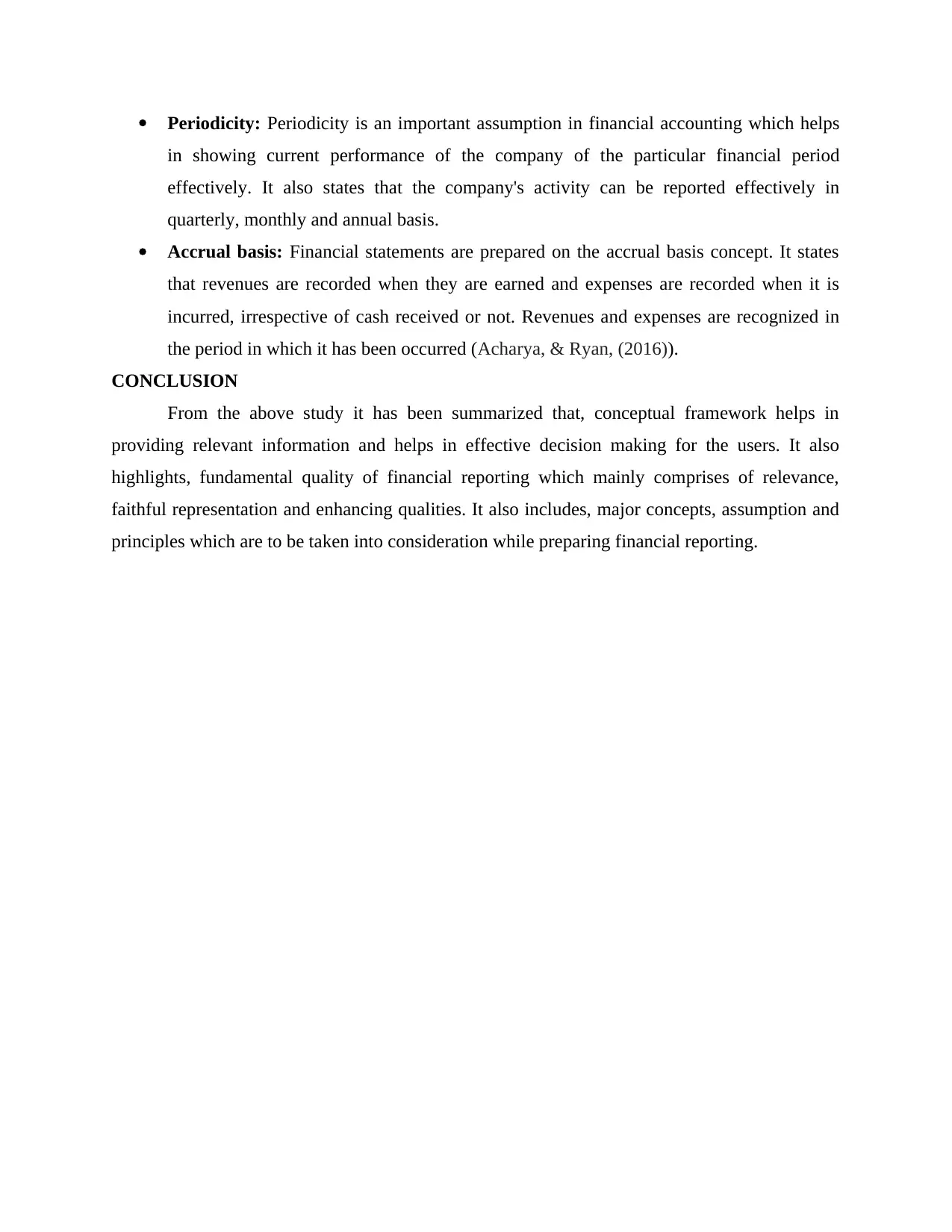
Periodicity: Periodicity is an important assumption in financial accounting which helps
in showing current performance of the company of the particular financial period
effectively. It also states that the company's activity can be reported effectively in
quarterly, monthly and annual basis.
Accrual basis: Financial statements are prepared on the accrual basis concept. It states
that revenues are recorded when they are earned and expenses are recorded when it is
incurred, irrespective of cash received or not. Revenues and expenses are recognized in
the period in which it has been occurred (Acharya, & Ryan, (2016)).
CONCLUSION
From the above study it has been summarized that, conceptual framework helps in
providing relevant information and helps in effective decision making for the users. It also
highlights, fundamental quality of financial reporting which mainly comprises of relevance,
faithful representation and enhancing qualities. It also includes, major concepts, assumption and
principles which are to be taken into consideration while preparing financial reporting.
in showing current performance of the company of the particular financial period
effectively. It also states that the company's activity can be reported effectively in
quarterly, monthly and annual basis.
Accrual basis: Financial statements are prepared on the accrual basis concept. It states
that revenues are recorded when they are earned and expenses are recorded when it is
incurred, irrespective of cash received or not. Revenues and expenses are recognized in
the period in which it has been occurred (Acharya, & Ryan, (2016)).
CONCLUSION
From the above study it has been summarized that, conceptual framework helps in
providing relevant information and helps in effective decision making for the users. It also
highlights, fundamental quality of financial reporting which mainly comprises of relevance,
faithful representation and enhancing qualities. It also includes, major concepts, assumption and
principles which are to be taken into consideration while preparing financial reporting.
⊘ This is a preview!⊘
Do you want full access?
Subscribe today to unlock all pages.

Trusted by 1+ million students worldwide
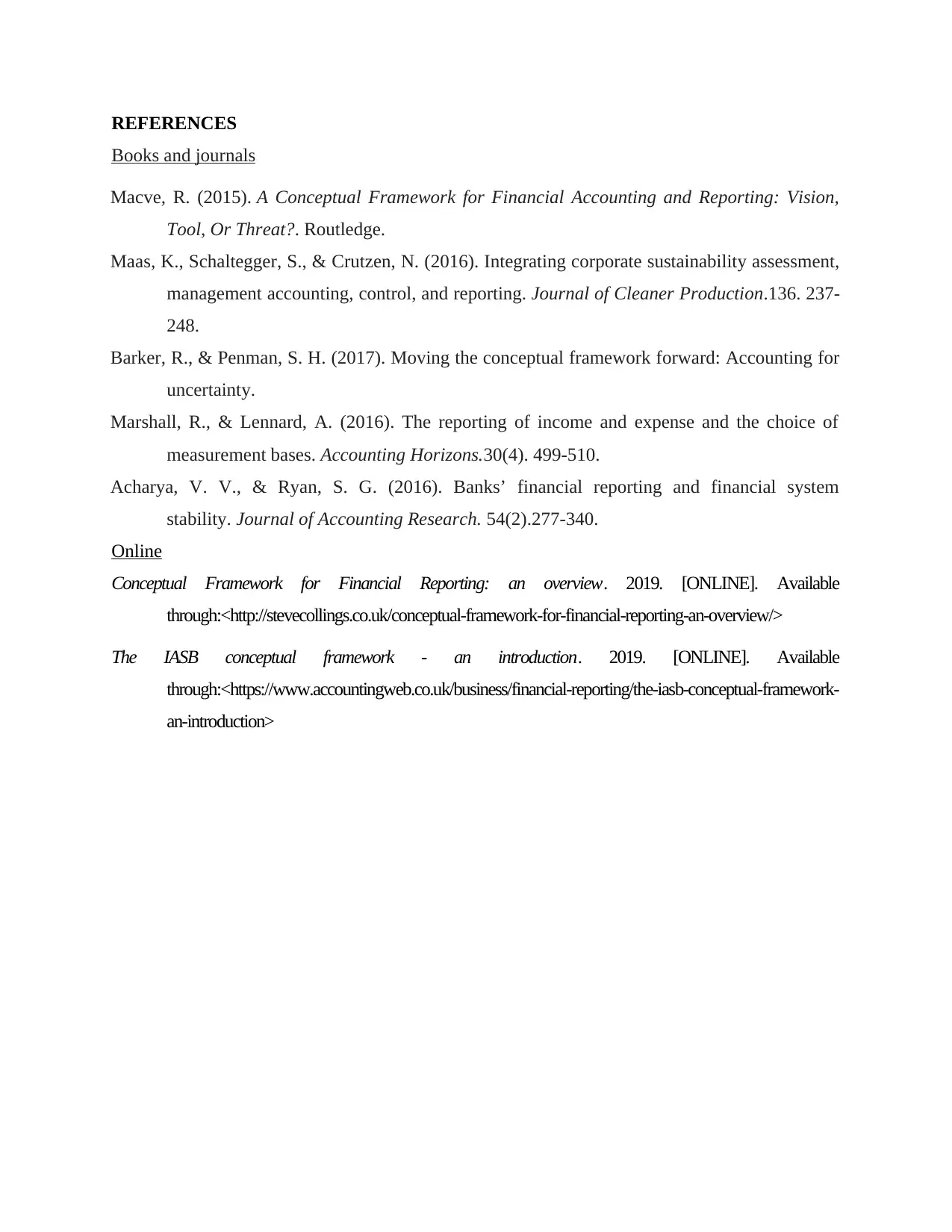
REFERENCES
Books and journals
Macve, R. (2015). A Conceptual Framework for Financial Accounting and Reporting: Vision,
Tool, Or Threat?. Routledge.
Maas, K., Schaltegger, S., & Crutzen, N. (2016). Integrating corporate sustainability assessment,
management accounting, control, and reporting. Journal of Cleaner Production.136. 237-
248.
Barker, R., & Penman, S. H. (2017). Moving the conceptual framework forward: Accounting for
uncertainty.
Marshall, R., & Lennard, A. (2016). The reporting of income and expense and the choice of
measurement bases. Accounting Horizons.30(4). 499-510.
Acharya, V. V., & Ryan, S. G. (2016). Banks’ financial reporting and financial system
stability. Journal of Accounting Research. 54(2).277-340.
Online
Conceptual Framework for Financial Reporting: an overview. 2019. [ONLINE]. Available
through:<http://stevecollings.co.uk/conceptual-framework-for-financial-reporting-an-overview/>
The IASB conceptual framework - an introduction. 2019. [ONLINE]. Available
through:<https://www.accountingweb.co.uk/business/financial-reporting/the-iasb-conceptual-framework-
an-introduction>
Books and journals
Macve, R. (2015). A Conceptual Framework for Financial Accounting and Reporting: Vision,
Tool, Or Threat?. Routledge.
Maas, K., Schaltegger, S., & Crutzen, N. (2016). Integrating corporate sustainability assessment,
management accounting, control, and reporting. Journal of Cleaner Production.136. 237-
248.
Barker, R., & Penman, S. H. (2017). Moving the conceptual framework forward: Accounting for
uncertainty.
Marshall, R., & Lennard, A. (2016). The reporting of income and expense and the choice of
measurement bases. Accounting Horizons.30(4). 499-510.
Acharya, V. V., & Ryan, S. G. (2016). Banks’ financial reporting and financial system
stability. Journal of Accounting Research. 54(2).277-340.
Online
Conceptual Framework for Financial Reporting: an overview. 2019. [ONLINE]. Available
through:<http://stevecollings.co.uk/conceptual-framework-for-financial-reporting-an-overview/>
The IASB conceptual framework - an introduction. 2019. [ONLINE]. Available
through:<https://www.accountingweb.co.uk/business/financial-reporting/the-iasb-conceptual-framework-
an-introduction>
1 out of 7
Related Documents
Your All-in-One AI-Powered Toolkit for Academic Success.
+13062052269
info@desklib.com
Available 24*7 on WhatsApp / Email
![[object Object]](/_next/static/media/star-bottom.7253800d.svg)
Unlock your academic potential
Copyright © 2020–2026 A2Z Services. All Rights Reserved. Developed and managed by ZUCOL.





